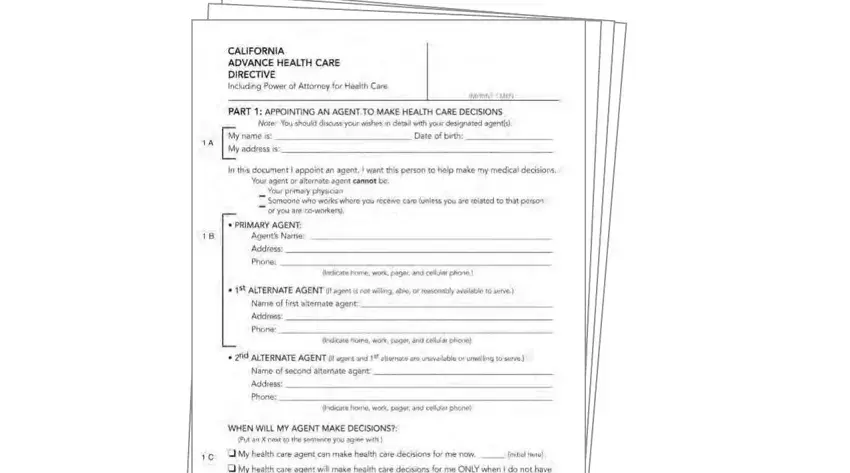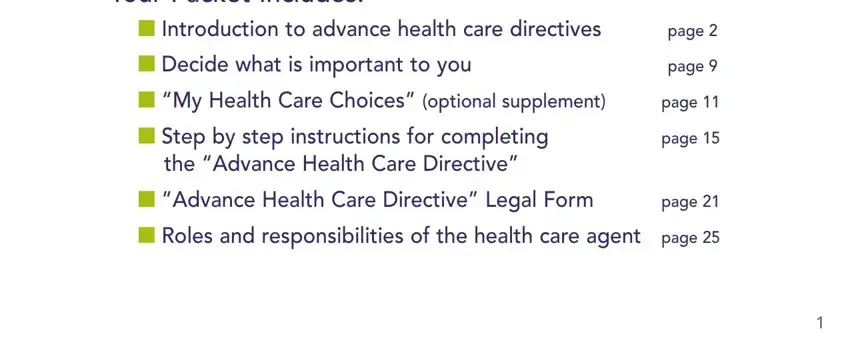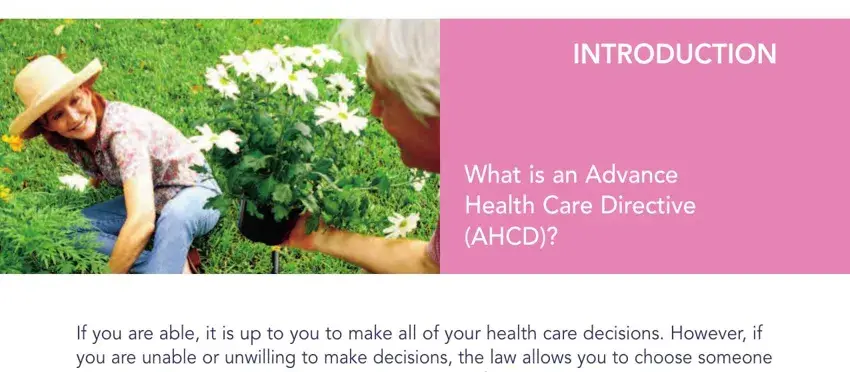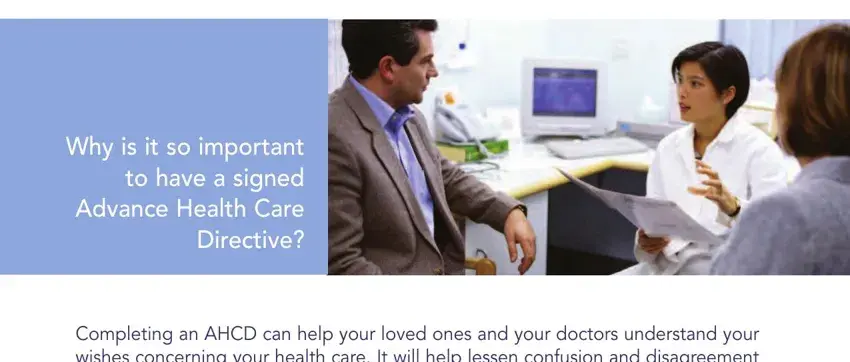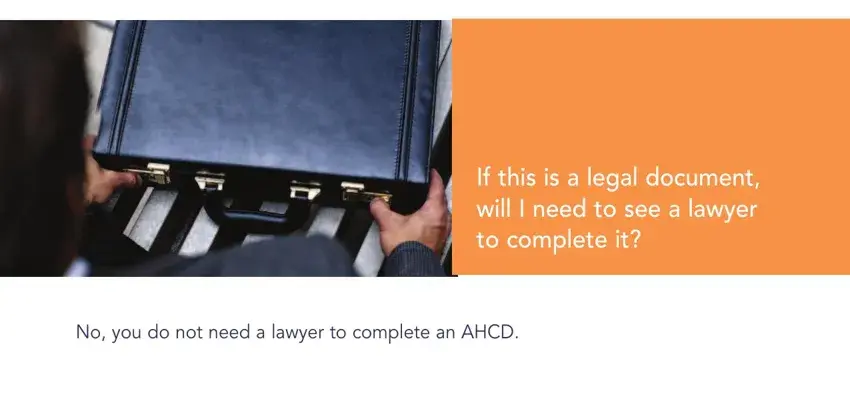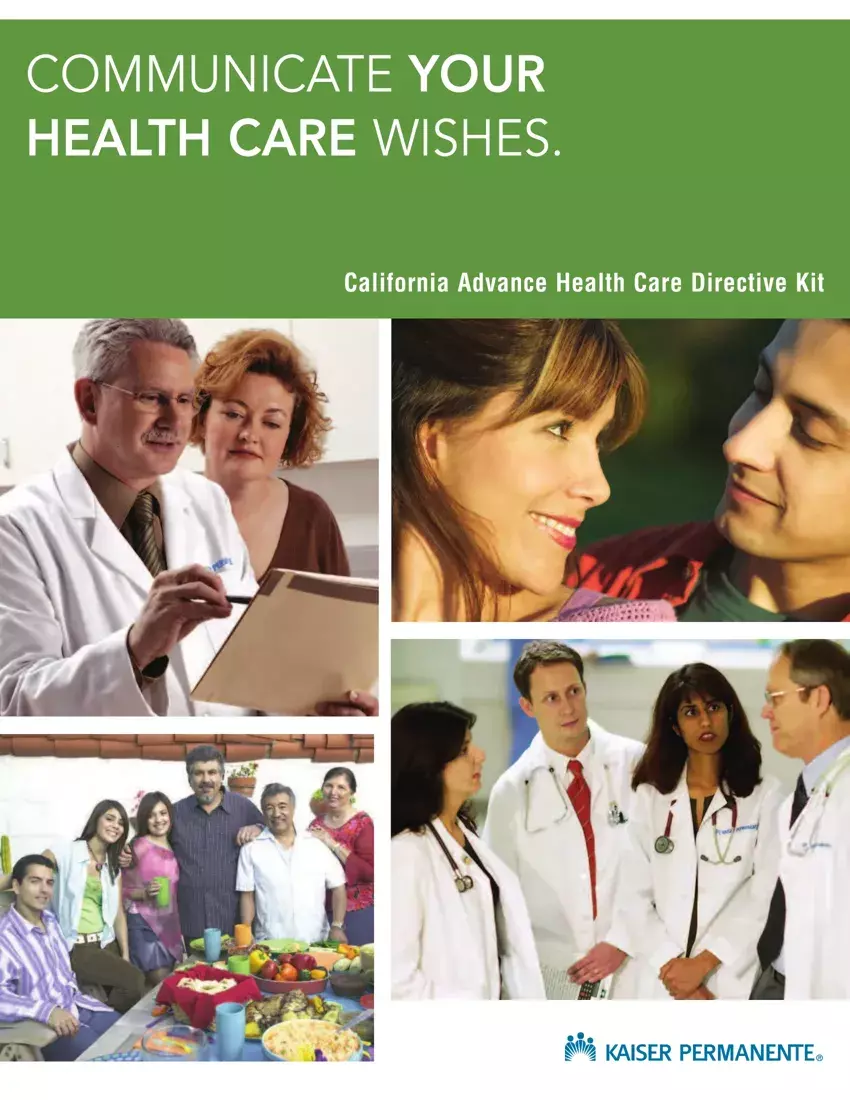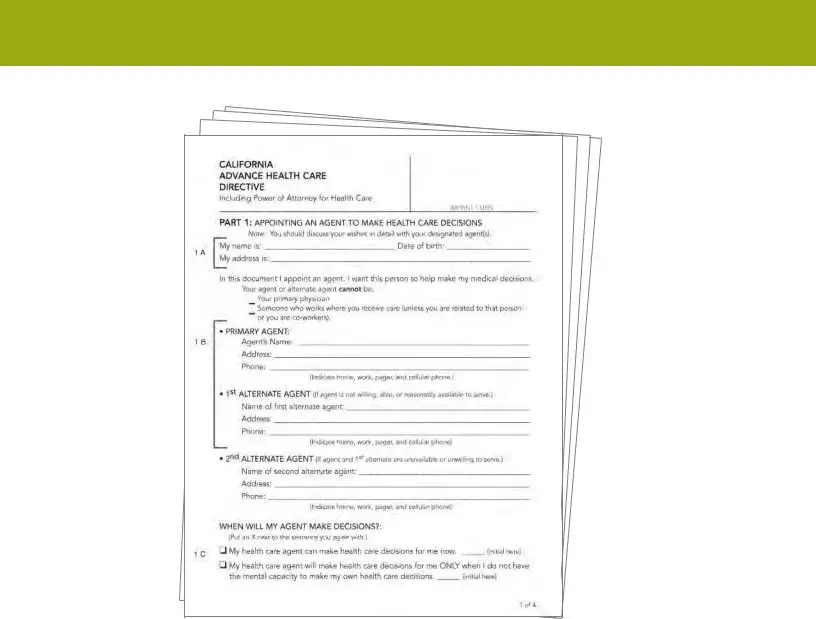COMMUNICATE YOUR
HEALTH CARE WISHES.
CALIFORNIA ADVANCE HEALTH CARE DIRECTIVE KIT
CALIFORNIA ADVANCE HEALTH CARE DIRECTIVE
Your Packet Includes:
■Introduction to advance health care directives |
page 2 |
■Decide what is important to you |
page 9 |
■“My Health Care Choices” (optional supplement) |
page 11 |
■Step by step instructions for completing |
page 15 |
the “Advance Health Care Directive” |
|
■”Advance Health Care Directive” Legal Form
■Roles and responsibilities of the health care agent
INTRODUCTION
What is an Advance Health Care Directive (AHCD)?
If you are able, it is up to you to make all of your health care decisions. However, if you are unable or unwilling to make decisions, the law allows you to choose someone else to make health care decisions on your behalf.
An Advance Health Care Directive or AHCD is a legal document. It allows you to tell others what kind of health care you want to receive when you are too sick and unable to make decisions about your care.
The AHCD form also lets you identify the person(s) you choose who will work with your doctors and others to help ensure that your wishes about your health care are carried out. This person is called the health care agent.
You can also write down your wishes about organ donation and identify your personal care physician.
Unlike the earlier Durable Power of Attorney for Health Care (DPAHC), the Advance Health Care Directive does not expire. It will stay in effect until you revoke or change it. (Please note: If you have a signed DPAHC that was valid before July 1, 2000, it remains valid.)
Anyone age 18 years or older who is able to make his or her own health care decisions can establish an Advance Health Care Directive.
2
Why is it so important to have a signed Advance Health Care Directive?
Completing an AHCD can help your loved ones and your doctors understand your wishes concerning your health care. It will help lessen confusion and disagreement over your personal wishes and choices concerning your care at a time when you are too sick to make those choices yourself. So it’s important to talk about your wishes with your doctor, family, and close friends now, before you are too sick to talk or write about issues such as your quality of life, your choices about treatment, and how you would want to spend your final days.
If this is a legal document, will I need to see a lawyer to complete it?
No, you do not need a lawyer to complete an AHCD.
3

Why do I need to choose an agent?
If a situation arises in which you are no longer able to make health care decisions for yourself, family and other loved ones may become involved in making those decisions. Even when you write down and share your wishes with others close to you, occasionally people will disagree about what may be the best care for you. This is why you need to select one person to help ensure your wishes about your care are honored and to make any additional heath care decisions for you. It is best to choose a close relative or personal friend whom you trust, who understands your values, and who will agree to honor your wishes. You can also name another person(s) to act on your behalf in case the first person you select is no longer available or is unable to make health care decisions for you. These people are called the alternate agent(s). You can also indicate if there is a specific person(s) you do not want to be involved in making decisions for you.
If you are concerned and want to spare loved ones from the burden of decision- making, you may want to consider choosing a CLOSE FRIEND who understands your wishes and who can act as your agent.
Try to select an agent who is most likely to be comfortable carrying out your wishes about your care. Make your wishes known to him or her, as well as to everyone else who is likely to be close to you in such circumstances. This is especially important if you think people may not agree or there could be conflict about your care.
What if I don’t choose a health care agent?
If you became unable to make your own decisions, your doctors will ask your closest family members to act on your behalf. If family members cannot agree and decisions cannot be reached in a timely fashion, emotional stress and conflicts among family members can result. Also, if there is no one willing or available to make health care decisions on your behalf, a court appointed representative who doesn’t necessarily know your values and wishes may have to make critical care decisions for you.
What types of decisions can my health care agent make?
Your agent becomes your representative. He or she participates in medical decisions by representing your interests. This includes decisions like:
•Changing your doctor, nurse, or social worker.
•Where you receive medical care (at home, or in a hospital).
•Your medications, tests, and medical treatment.
•What happens to your body and organs after you die.
Becoming your agent does not mean that he/she assumes financial responsibility for you.
Your health care agent acts for you and makes all health care decisions on your behalf, unless you limit his or her authority.
5
Who cannot be my health care agent?
Your health care agent cannot be:
•The doctor who is managing your care.
•An operator or employee of a community care facility or a residential care facility where you are receiving care.
•An employee of the health care institution where you are receiving care, unless that person is related to you by blood, marriage, or adoption.
When does my health care agent make decisions for me?
Your health care agent will usually make decisions only if you are unable to make them yourself, such as if you have lost the ability to understand things.
You can appoint your health care agent to act on your behalf at any time, even when you are still capable of making your own decisions, but you no longer want to make decisions about your care.
If you do not have an Advance Directive and suddenly become ill, you can appoint a temporary health care agent to let the doctor know who you want to make decisions for you. Your oral instruction is just as valid as a written one.
6
What if I want to provide specific health care instructions that are not on the AHCD form?
You can write more detailed health care instructions on additional sheets of paper, or you can use the communication form, “My Health Care Choices,” which was designed to help you clarify your wishes for your doctor and loved ones. (See pages 11–14.)
Attach your instruction sheet(s) to the Advance Health Care Directive and write the number of pages you are attaching.
Sign and date the attachments and have them witnessed or notarized at the same time you have your form witnessed or notarized.
Provide your health care agent(s) and doctor(s) with a copy of your specific health care instruction sheet(s) to ensure they understand your wishes.
6
You must sign the form.
Who needs to sign this form?
Have two WITNESSES sign the form. If you do not have witnesses, you need a Notary Public. A notary public’s job is to make sure you are the person who is signing the form.
Your witnesses must be over the age of 18, they must know you, and must either be present when you sign the form or, believe you are the person who signed the form.
YOUR WITNESSES CANNOT BE:
•Your health care provider or an employee of your health care provider.
•Your agent or alternate agent(s).
•An operator or employee of an operator of a community care or residential care facility.
At least one of the witnesses cannot be related to you by blood, marriage or adoption, be named in your will, or be someone who would benefit from your estate.

What should I do after I have my AHCD signed and witnessed?
•Make several copies of the form. Keep the original in a place where you can find it easily, and tell others where you put the forms. Do not keep your AHCD in a safe deposit box because other people may need to find it quickly in an emergency.
•Return the original signed and witnessed form to your doctor at your next visit. Your doctor will include it in your medical records.
•Give photocopies to your agent and alternate agent (s). Be sure that everyone who might be involved with your health care, such as your family, clergy, or friends has a copy. Photocopies are just as valid as the original.
•Make a list of all the people and facilities who receive copies of your AHCD.
•Keep a copy for yourself in a visible, easy-to-find location and not locked up in a drawer.
•Take a copy of the form with you if you are going to be admitted to a hospital, nursing home, or other health care facility.
What if I change my mind after completing my AHCD?
You can change or cancel your AHCD at any time. Remember to get back all the old forms and replace them with your new AHCD forms.
Where can I find more information about
Advance Health Care Directives?
•Contact your local Kaiser Permanente Health Education Center or Department.
•Connect to our Web site at kp.org and enter “writing an advance directive” in the search box.
•You can also visit your doctor’s home page at kp.org/mydoctor if you are a Kaiser Foundation Health Plan member in Northern California. Go to the “Health Information and Resources” section on the left navigation bar, then click “advance care planning.”
DECIDE WHAT IS
IMPORTANT TO YOU
The following information can help you decide on the type of care that is right for you in case you become seriously ill or come to the end of your life. Use the
attached PERSONAL HEALTH CARE INSTRUCTIONS COMMUNICATION FORM to share your
wishes with your health care agent, other loved ones, and your health care providers.
Your Quality of Life, Values, and Decisions – An important step in helping your agent understand your wishes is to communicate what gives value to your life. There are many things to consider. Be sure to tell your agent your beliefs about serious illnesses and death. If you were found to have a serious illness, to what extent do you want to be treated? Do you want to be on life support?
Treatment choices – It is important to think about different situations where you would need treatment. Think about what types of treatment you would want for sudden illness, for example, a heart attack, or for an illness that could end your life, such as cancer.
For each illness, think about what type of treatment you would want. Be sure to communicate this to your agent.
Examples of Life Support Treatments:
CPR or cardiopulmonary resuscitation – when your heart stops
cardio = heart |
pulmonary = lungs |
resuscitation = try to restart |
This kind of treatment involves all of these actions:
•Pressing hard on your chest to try to pump the blood, sometimes so forcefully that it breaks ribs.
•Using electrical shocks to try to restore heart beat.
•Placing a tube into your windpipe attached to a bag to pump air into your lungs.
•Injecting medicines into your veins.
9
